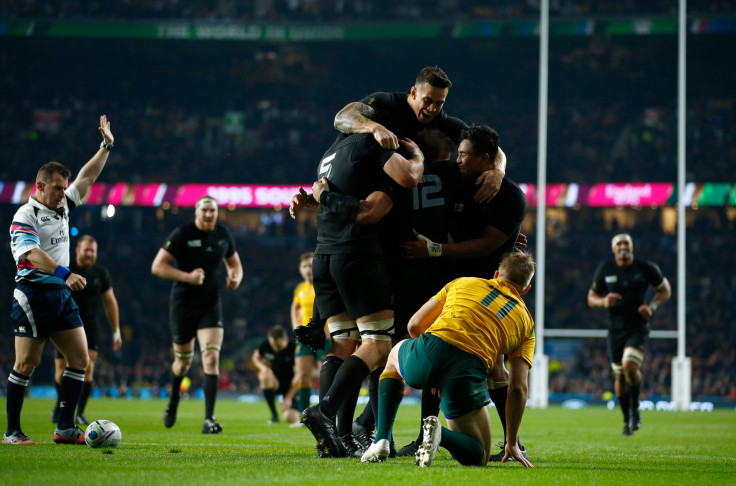VIDEO Rugby World Cup Final 2015 Highlights: New Zealand Beats Australia In Historic Triumph

New Zealand held off a spirited fight back from Australia to confirm their status as the world’s supreme rugby nation with a 34-17 victory in the World Cup final at London’s Twickenham Stadium. In front of a crowd of more than 82,000, the All Blacks made history, becoming not only the first team to retain the Rugby World Cup but also the first to lift the trophy for a third time in the quadrennial event’s 28-year history.
And they surely couldn’t have wished for better circumstances in which to seal such lofty accomplishments. It was the first ever final between the two neighboring rivals and the world’s top two tanked teams, with the All Blacks denying the Wallabies their own third World Cup title.
In the end they were forced to do it the hard way. Having controlled the first half, New Zealand looked set to run away with the final after scoring a try either side of halftime, through Nehe Milner-Skudder and Ma’a Nonu, to take a 21-3 advantage. But a yellow card for All Black Ben Smith, that left his team down a man for 10 minutes, gave Australia a lifeline that they clung onto when David Pocock drove over the line. And when Tevita Kuridrani exploited Australia’s man advantage further to cut the deficit to four points with 16 minutes remaining the contest was thrown well and truly back in the balance.
But as so often in his distinguished career, it was the boot of Dan Carter that steadied New Zealand. A sensational drop goal with 10 minutes left gave the All Blacks some breathing room, which he soon built on with a penalty. And the 33-year-old’s conversion after a late breakaway try from Beauden Barrett saw the All Blacks win running away and took Carter’s personal tally to 19 points. His supreme and near faultless kicking, also crucial in a narrow semifinal win over South Africa, extended his record as international rugby’s highest ever points scorer, and was a fitting way to to bow out in his 112th and final international.
The moment was made even more special for Carter after he missed the New Zealand celebrations on home soil four years ago. He isn’t the only All Black legend set to depart the stage at the very top of his sport. Experienced captain Richie McCaw is expected to confirm his retirement, and, after some early Carter penalties, it was his pass, the climax of some brilliant All Blacks handling, that helped break open New Zealand’s advantage with the first try of the match right before halftime. Nehe Milner-Skudder, a breakout star of this World Cup at the other end of the experience scale to McCaw, dived over the line in the corner to give New Zealand a 16-3 advantage.
It was a decisive moment to make New Zealand’s possession and territorial advantage -- which read at 71 percent and 79 percent, respectively, in the first half -- count. And they looked home and dry when just two minutes into the second half, substitute Sonny Bill Williams offloaded for Nonu to burst through gaping holes in the Australia defense and, after side-stepping the last defender, score a thrilling try.
Australia had been anemic to that point, struggling to get any kind of attack going, not helped by injuries that brought the finals of Kane Douglas and Matt Giteau to an early end. After a grueling World Cup in which they had to come through the “Pool of Death” against England and Wales, Michael Cheika’s team, which had surpassed low expectations when he took over just a year ago, appeared to have nothing left. It is to their credit that they took advantage of Smith’s sin-binning to make the match a real contest.
Pocock furthered his credentials as a player of the tournament by scoring from a driving maul, and just as Smith was due to return, Kuridrani went over following an inspired kick from Will Genia. New Zealand, though, thanks to the calming influence of Carter, would not be denied a first ever World Cup triumph away from home.
© Copyright IBTimes 2025. All rights reserved.





















